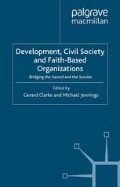Abstract
Defining Hezbollah as a faith-based organization (FBO) may seem unusual as it is normally labelled by many Westerners as a terrorist organization and is thus rarely examined as an ‘ordinary’ or legitimate political player. Yet, this is the position I adopt here. This chapter considers Hezbollah as a Lebanese political party which has been in charge of the elaboration and implementation of development policies for middle and lower-income Shi’i groups for over 25 years. I will also analyse the role of Hezbollah’s affiliated institutions as FBOs and will argue that their successes in service provision and management makes them, in certain conditions, effective and accountable partners for development stakeholders. Before proceeding, I will briefly relate Hezbollah to the Lebanese political context.
Access this chapter
Tax calculation will be finalised at checkout
Purchases are for personal use only
Preview
Unable to display preview. Download preview PDF.
Bibliography
Bahout J., 1994, ‘Deux ans après les élections législatives de l’été 1992, où en est le parlementarisme libanis?’, Revue Internationale et Stratégique, 16, pp. 57–66.
Charara W., 1996, Dawlat Hezbollah [The Hezbollah State], Beirut: Dar an-Nahar.
Dagher A., 2002, ‘L’administration libanaise après 1990’, unpublished paper presented at the conference Le modèle de l’Etat développemental et les défis pour le Liban, LCPS, Beyrouth, 15–16 February.
Deeb L., 2006, An Enchanted Modern: Gender and Public Piety in Shi’i Lebanon, Princeton: Princeton University Press.
European Commission — Joint Research Center, 2006, Rapid Preliminary Damage Assessment, Beirut and South Lebanon, August, p. 3, available online at www.rebuildlebanon.gov.lb, accessed 22 August 2007.
Fattouh B. and Kolb J., 2006, ‘The Outlook for Economic Reconstruction After the 2006 War’, The MIT Electronic Journal of Middle-East Studies, 6(1), pp. 96–114.
Fawaz M., 2004a, Strategizing for Housing: An Investigation of the Production and Regulation of Low-Income Housing in the Suburbs of Beirut, unpublished PhD dissertation in Urban Planning, Boston: MIT.
Fawaz M., 2004b, ‘Action et idéologie dans les services: ONG Islamiques dans la banlieue sud de Beyrouth’, In Ben Nefissa S. et al. (eds), ONG et Gouvernance dans le Monde Arabe, Paris: Karthala and Cedej, pp. 341–367.
Ferris E., 2005, ‘Faith-Based and Secular Humanitarian Organizations’, International Review of the Red Cross, 87(858), pp. 311–325.
Gaudin J.-P., 2004, L’Action Publique. Sociologie et Politique, Paris: Presses de Sciences Po et Dalloz.
Haddad S., 2006, ‘The Origins of Popular Support for Lebanon’s Hezbollah’, Studies in Conflict and Terrorism, 29(1), pp. 21–34.
Hage, G., 2003, ‘“Comes a Time We Are All Enthusiasm”: Understanding Palestinian Suicide Bombers in Times of Exighophobia’, Public Culture, 15(1), pp. 65–89.
Hamzeh N., 1993, ‘Lebanon’s Hizbullah: From Islamic Revolution to Parliamentary Accommodation’, Third World Quarterly, 14(2), pp. 321–337.
Hamzeh N., 2004, In the Path of Hizbullah, New York: Syracuse University Press.
Harb M., 2001, ‘Pratiques comparées de participation dans deux municipalités de la banlieue de Beyrouth: Ghobeyri et Bourj Brajneh’, In A. Favier (ed.), Municipalités et Pouvoirs Locaux au Liban, Beirut: CERMOC, pp. 157–177.
Harb M., 2005, Public Action in a Multi-Confessional Political System: Shi’i Political Movements in Post-War Lebanon, PhD in Political Science, Institut d’Etudes Politiques, University of Aix-en-Provence.
Harb M. and Leenders R., 2005, ‘Know Thou Enemy: Hezbollah and the Politics of Perception’, Third World Quarterly, 25(5), pp. 173–197.
Harik J., 1996, ‘Between Islam and the System: Sources and Implications of Popular Support for Lebanon’s Hezbollah’, Journal of Conflict Resolution, 40(1), pp. 41–67.
Harik J., 2004, Hezbollah: The Changing Face of Terrorism, London: IB Tauris.
ICG/Middle-East Briefing, 2003, Hizb’Allah: Rebel Without a Cause?, Bruxelles: ICG.
LCPS, 1999, Al-intikhabât al-baladiyya fi Loubnân 1998, makhâd al-dimoukratiyya fil moujtama’ât al-mahalliyya (The Municipal Elections in Lebanon in 1998 and the Democracy Process in Local Communities), Beirut: LCPS.
Leenders R., 2004, ‘Nobody having too much to answer for: ‘laissez-faire’, networks and post-war reconstruction in Lebanon’, In Heydemann S. (ed.), Networks of Privilege: The Politics of Economic Reform in the Middle East, New York: Palgrave, pp. 169–200.
Mark C. A. and Prados A. B., 2005, Lebanon, CRS Issue Brief for Congress, Washington: Congressional Research Service. IB8911B.
Muller P. and Surel Y., 1998, L’Analyse des Politiques Publiques, Paris: Montchrestien.
Norton A. R., 1987, Amal and the Shi’a: Struggle for the Soul of Lebanon, Austin: University of Texas Press.
Norton A. R., 1998, ‘Hezbollah: From Radicalism to Pragmatism?’, Middle East Policy, 5(4), pp. 147–159.
Picard E., 1995, ‘Les habits neufs du communautarisme libanais’, Cultures et conflits, 15–16, pp. 49–70.
Qassem, N., 2002, Hezbollah: al-manhaj, al-tajriba, al-mustaqbal (Hezbollah: Method, Experience, Future), Beirut: Dar al-Hadi.
Renders M., 2002, ‘An Ambiguous Adventure: Muslim Organizations and the Discourse of Development in Senegal’, Journal of Religion in Africa, 32(1), pp. 61–82.
Saad-Ghorayeb A., 2002, Hezbollah: Politics and Religion, London: Pluto Press.
Saad-Ghorayeb A., 2006, ‘Hizbollah’s Outlook in the Current Conflict, Part One: Motives, Strategy and Objectives’, Carnegie Endowment for International Peace, Policy Outlook.
Tyndale W., 2000, ‘Faith and Economics in “Development”: a Bridge Across the Chasm?’, Development in Practice, 10(1), pp. 9–18.
Ver Beek K. A., 2000, ‘Spirituality: A Development Taboo’, Development in Practice, 10(1), pp. 31–43.
Wakim N., 1998, Al-ayâdî al-soud (Les mains noires), Beyrouth: Charikat al-matbu’at lil tawzi’ wal nachr.
Editor information
Editors and Affiliations
Copyright information
© 2008 Mona Harb
About this chapter
Cite this chapter
Harb, M. (2008). Faith-Based Organizations as Effective Development Partners? Hezbollah and Post-War Reconstruction in Lebanon. In: Clarke, G., Jennings, M. (eds) Development, Civil Society and Faith-Based Organizations. International Political Economy Series. Palgrave Macmillan, London. https://doi.org/10.1057/9780230371262_10
Download citation
DOI: https://doi.org/10.1057/9780230371262_10
Publisher Name: Palgrave Macmillan, London
Print ISBN: 978-1-349-28608-9
Online ISBN: 978-0-230-37126-2
eBook Packages: Palgrave Political & Intern. Studies CollectionPolitical Science and International Studies (R0)

